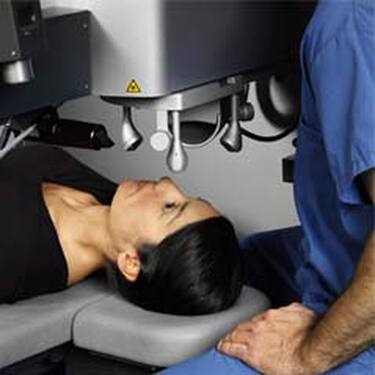Glaucoma
|
GLAUCOMA TREATMENT/ SURGERY GLAUCOMA:
"THE SNEAK THIEF OF SIGHT" Glaucoma is often referred to as the "sneak thief of sight." It has been given this name because the most common type, known as Chronic Open Angle Glaucoma, has no pain or symptoms associated with its onset. Glaucoma is the leading cause of blindness in the United States. Fortunately, if it is treated in its earliest stages, damage and loss of vision are usually preventable. Glaucoma is caused by the buildup of aqueous inside the front of the eye. Aqueous is a clear fluid that constantly flows through the inner chamber of the eye, maintaining a certain pressure. When this fluid builds up, it causes abnormal pressure inside the eye and can cause progressive damage to the optic nerve in the back of the eye.
|
This damage is permanent. It is very important to have regular complete eye exams. Glaucoma can be treated with medication, in some cases laser surgery or other surgical procedures may be necessary to reduce the intraocular pressure. Regular eye exams, especially for individuals with a family history of glaucoma, are very important.
Risk Factors:
- Increasing age
- Family history
- African-American heritage
- Diabetes
- High Blood Pressure
- Nearsightedness
- Long-term steroid treatment
- Eye injuries
The second type and less common Glaucoma is called Acute or (Closed Angle). This is caused when the angle between the iris and the cornea narrows or closes. This narrowing obstructs the drainage of the aqueous fluid. This condition may be caused by trauma, such as a blow to the eye.
Pressure in the eye builds rapidly causing severe pain and blurred vision. If you have severe eye pain with the other symptoms listed below, it is important to have an examination by your eye care doctor as soon as possible. It is usually accompanied by extreme pain in the eye area, redness, headache and nausea. This condition must be treated at once, since the quick increase in pressure will cause permanent damage to the optic nerve.
Symptoms:
- Severe eye pain
- Red and irritated eye
- Headaches
- Blurred vision
- Nausea, vomiting
- Halos around lights
- Mid-dilated pupil
If you would like more information about Glaucoma, call us at (716) 896-8831, and we would be glad to answer your questions.

